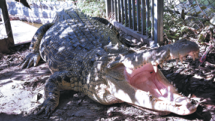Killer crocodiles pose risk in E. Timor

LOSPALOS, East Timor-Mario Da Cruz could only watch in horror as a small army of crocodiles killed a child on an East Timor beach-another victim of the tiny nation's soaring rate of attacks.
Such incidents have jumped more than 20-fold over the past two decades with an average of one person a month falling prey to the ferocious reptiles, though not all are fatal.
"I was walking along the beach and suddenly this group of crocodiles came out of the water so I panicked and ran, but one of them bit my leg," explained Da Cruz.
East Timor sits between Indonesia and Australia, and a large number in the impoverished nation of 1.2 million rely on the waterways for every aspect of life.
"They have had a pretty serious increase in the number of crocodile attacks in the past 10 years," said Sam Banks, a conservation biologist at Australia's Charles Darwin University.
Sebastian Brackhane at Germany's University of Freiburg and other scientists have looked at what might be behind the jump in a country with a relatively low population of native crocs, including the possibility of humans encroaching on their habitat.
But "we think that an increase in the number of large saltwater crocodiles is the primary factor", he said.
"The problem is not limited to (East Timor). Other islands, such as the Solomon islands and the Andamans, and several coastal areas of Indonesia show similar patterns of increasing human-crocodile conflict," Brackhane added.
Many Timorese, who revere the reptiles, believe the rise in attacks is down to foreign creatures swimming over from Australia or elsewhere in search of food.
Banks says that conservation efforts have boosted Australia's crocodile population, leading to greater competition for resources-and potentially forcing some to go farther afield.
So he and Yusuke Fukuda, a wildlife scientist with Australia's Northern Territory government, are hoping that DNA testing will solve the mystery surrounding the sudden rise in crocodile attacks.
Scientists say it is feasible for the creatures, which can grow up to 6 meters long and weigh 1,000 kilograms, to make the 500-kilometer journey across the Timor Sea from Australia.
Banks and Fukuda, with the blessing of Timorese officials, took DNA samples from 18 crocodiles during a recent two-week trip. The Timor samples were then compared against a database of Australian ones to see if there was a genetic match.
Results from the first round of tests give no indication that foreign reptiles are present in local waters. "They're very much East Timorese. They don't show any evidence of Australian ancestry," Banks said.
But he cautioned that more testing across a wider area is required to get a clearer picture and to rule out foreign crocodile attacks.

Today's Top News
- Xi replies to letter from teachers and students of US youth education exchange delegation
- China to beef up personal data protection in internet applications
- Beijing and Dar es Salaam to revitalize Tanzania-Zambia Railway
- 'Kill Line' the hidden rule of American governance
- Warming of oceans still sets records
- PBOC vows readiness on policy tools





























